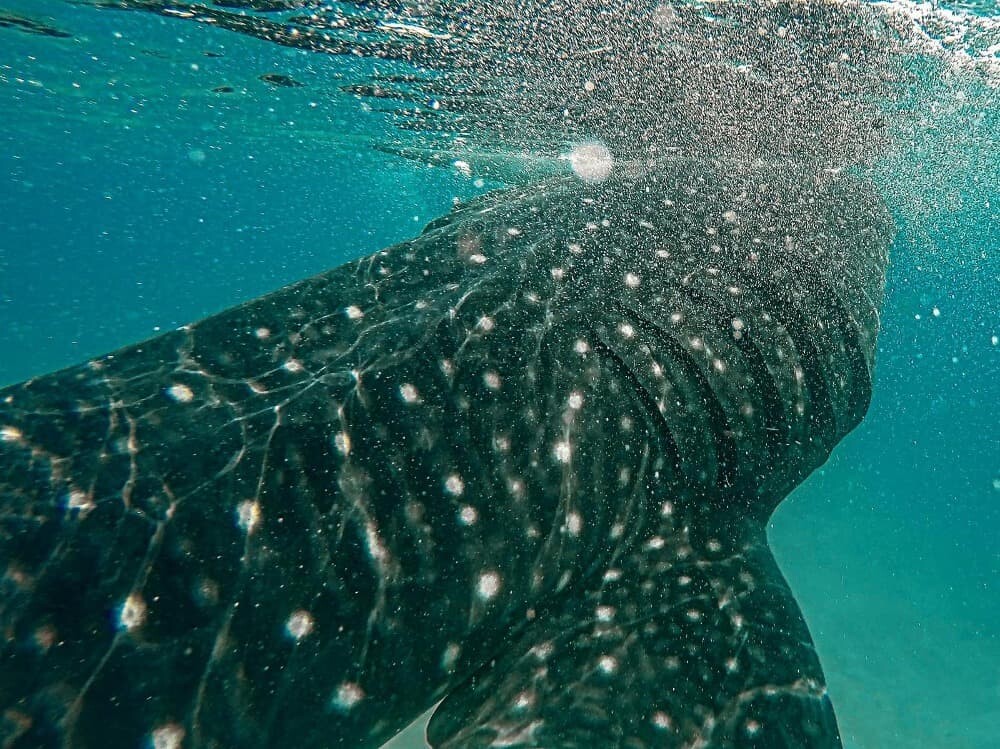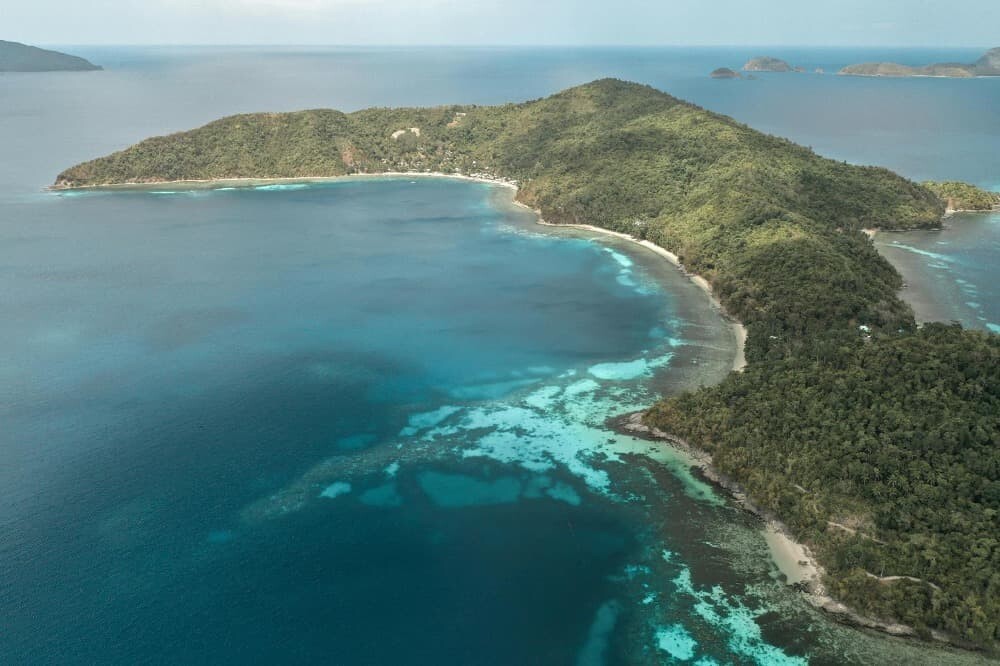The whale shark (Rhincodon typus) is the largest fish in the sea, and although seeing them in the wild and swimming with them can be imposing, their diet is based on plankton.
Cooperating Volunteers collaborates in various destinations where, during your free time, you might be able to take an excursion and, with luck, see them. It’s an unforgettable experience.
Today, we’ll share a bit more about them and some interesting facts you might not know.
This animal can exceed 12 meters in length and weigh more than 21 tons, making it the largest fish in the world. Despite its imposing size, as mentioned earlier, it is a gentle creature known for its calm behavior and filter-feeding diet (humans and most marine animals are not on their menu).

Its elongated body is covered in white spots and lines, a unique pattern for each individual, similar to human fingerprints. Its head is flattened and wide, with small barbels protruding from its nostrils. The extremely large mouth can measure up to 1.5 meters wide. Inside its mouth, hundreds of rows of small teeth align, though these are not used for chewing. Instead, the whale shark feeds by filtering water, capturing plankton, small fish, and crustaceans. They expel the water through their gills and retain all these foods.
Whale sharks prefer warm waters where they follow the migrations of plankton and other food sources, which is why they are present in all tropical seas. They congregate in different places depending on the time of year, giving them a global distribution, inhabiting all the world’s tropical and temperate oceans. Often, these sharks undertake long migrations, moving between feeding and breeding areas.
The reproduction of whale sharks remains a mystery in many aspects. It is known that they are ovoviviparous, meaning the females retain the eggs inside their bodies until the young are ready to be born. Newborn whale sharks measure between 40 and 60 centimeters in length. They are believed to reach sexual maturity at around 9 meters, although this can vary. A female whale shark can give birth to a large number of young in a single litter. One documented case found more than 300 embryos in a female.
The whale shark is classified as an endangered species by the International Union for Conservation of Nature (IUCN). The main threats to their survival include accidental fishing, maritime traffic, pollution, and targeted hunting in some regions. Habitat loss due to climate change also poses a significant threat.

Globally, various conservation measures have been implemented to protect this species. Many nations have banned whale shark fishing and established marine protected areas where these animals can feed and breed without human interference. Additionally, whale shark watching tourism has become an important source of income for some communities, incentivizing the conservation of these animals instead of their exploitation.
The calm nature of these animals allows many divers and snorkelers around the world to have close encounters with these giants of the sea. However, it is crucial that these interactions are conducted responsibly to avoid stressing the animals or disrupting their natural behavior. Strict regulations in many whale shark watching destinations help ensure that these activities are sustainable and safe for both the sharks and humans.
SOME CURIOSITIES
- They can live up to 70-100 years, although determining their exact age is a challenge for scientists. Techniques like measuring growth bands in the vertebrae are used to estimate age.
- In different cultures and languages, the whale shark is known by various names. In the Philippines, it is called “butanding,” in Mexico, “domino,” and in many other places, simply “monster fish.”
- Despite their size, whale sharks are slow swimmers, moving at an average speed of 5 km/h. However, they can undertake migratory journeys of thousands of kilometers between feeding and breeding areas.
- Although their mouth contains around 3,000 small teeth arranged in over 300 rows, these teeth do not play a significant role in their feeding.
- Whale sharks have the ability to emit bioluminescent light. This is especially noticeable in young individuals and may serve to attract prey or communicate with other whale sharks.
- Like some bats and dolphins, whale sharks are believed to use echolocation to navigate and find food, although this hypothesis is still being investigated.
- In several cultures, the whale shark is considered a symbol of luck and protection. For example, in the Philippine Islands, encountering a whale shark is believed to be a sign of good fortune.
WHERE CAN WE FIND THEM?
- MEXICO: Isla Holbox and the Yucatán Peninsula. Between June and September, whale sharks congregate in the waters of the Gulf of Mexico near Isla Holbox and the coast of the Yucatán Peninsula, especially around Isla Mujeres and Cancún.
- PHILIPPINES: Donsol and Oslob. In Donsol, whale shark sightings are common between November and June. In Oslob, sightings occur almost year-round due to the controversial practice of feeding them to attract them near the coast.
- AUSTRALIA: Ningaloo Reef. Between March and July, the Ningaloo Reef on Australia’s west coast is an excellent place to spot whale sharks, especially during the annual migration.
- MALDIVES: Ari Atoll and Baa Atoll. Whale sharks can be seen year-round in the Maldives, but are more common between May and December. Ari Atoll is particularly famous for these sightings.
- SEYCHELLES: Mahe Island and surroundings. In the Seychelles, whale sharks are usually observed between October and April, following the plankton migration.
- MOZAMBIQUE: Tofo Beach. Between October and March, Tofo Beach in Mozambique is a prominent location to see whale sharks, which feed on the plankton-rich waters.
- TANZANIA: Mafia Island. Mafia Island, especially between October and March, offers a good opportunity to spot whale sharks.
- MADAGASCAR: Nosy Be Island. Between September and December, Nosy Be Island is an excellent place to see them.
- INDIA: Lakshadweep Islands. The Lakshadweep Islands, particularly around the atolls, are known whale shark sighting spots between May and December.
- INDONESIA: Cenderawasih Bay. This place in West Papua is known for its regular whale shark sightings, attracted by small fish and plankton year-round.
The whale shark is one of the ocean’s marvels, a gentle giant playing a crucial role in the marine ecosystem.




